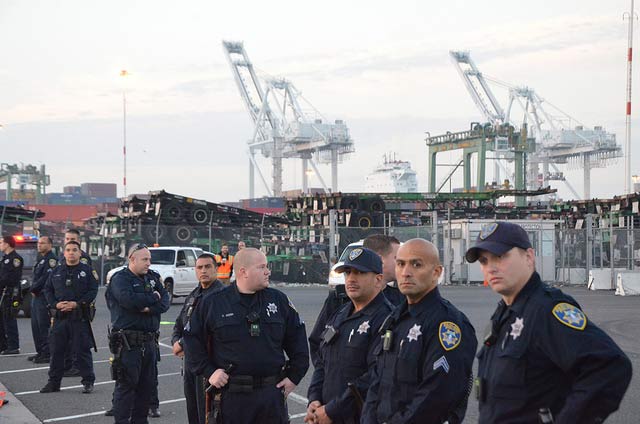
Honest, paywall-free news is rare. Please support our boldly independent journalism with a donation of any size.
Port truckers in California walked off the job in November to protest their dismal working conditions. Required to lease trucks while paying insurance and maintenance costs, drivers often earn less than minimum wage.
The strike came just days after big box retailers, manufacturers, and other supply chain stakeholders sent President Barack Obama a letter warning that labor disputes could cause “a full shutdown of every West coast port.”
Spearheaded by the National Retail Federation — whose members include large corporate retailers like Wal-Mart — the letter stated that a shutdown would be “catastrophic,” costing the economy up to $2 billion a day. Over a hundred business associations who signed the letter requested “immediate action” by the federal government to prevent such losses.
Though a shutdown did not happen, tensions remain as port truckers, dockworkers, and other workers step up their demands to be treated fairly during the peak holiday season.
This isn’t the first time in our nation’s history that a transportation strike has made big business anxious. In 1877, when thousands of railroad workers went on strike in a dozen American cities, businessmen pleaded with then-President Rutherford B. Hayes to intervene.
Businessmen had reason to worry. At the height of the 1877 strikes, more than half the freight on the nation’s railways stopped running.
Circumstances leading to the railroad strikes were not unlike our own today. Unregulated economic growth after the Civil War concentrated wealth in a few hands. Labor conditions deteriorated as big business sought ever greater profits. The first Gilded Age was born.
Then, as now, transportation workers held the strongest hand in demanding higher wages and better conditions. Unlike other workers, they could disrupt business as usual everywhere.
The railroad strikes showed how powerful workers could be when they united. Workers across all industries responded in solidarity when business and government tried to put down the railroad strikes.
After 1877, labor unions grew and more strikes ensued. Ultimately, this led to passage of the Fair Labor Standards Act, the bedrock of modern employment rights.
Over a hundred years later, port truck drivers are denied the very same employment rights that workers in the first Gilded Age fought so hard to achieve. In the last year, port truckers have gone on multiple strikes protesting their misclassified status as “independent contractors.” Nearly 70 percent of port truckers are denied protections and benefits due to misclassification, according to the National Employment Law Project.
Port trucking was a secure, middle-class occupation until Congress first deregulated the trucking industry in 1980. Now, most port truckers lack basic labor rights, such as workers’ compensation, overtime pay, and even a guaranteed minimum wage.
Port truckers aren’t the only workers in this boat. They’re also an essential link in a supply chain that ends with low-wage retail workers at Wal-Mart. If port truckers wage a protracted strike, it could reverberate throughout the entire national economy.
While their plight hasn’t commanded the widespread attention that the 19th century rail strikes did back then, port workers just might be the key to restoring basic labor rights for all Americans.
Media that fights fascism
Truthout is funded almost entirely by readers — that’s why we can speak truth to power and cut against the mainstream narrative. But independent journalists at Truthout face mounting political repression under Trump.
We rely on your support to survive McCarthyist censorship. Please make a tax-deductible one-time or monthly donation.